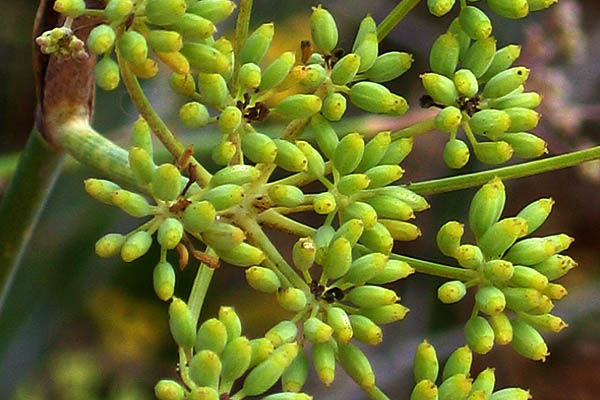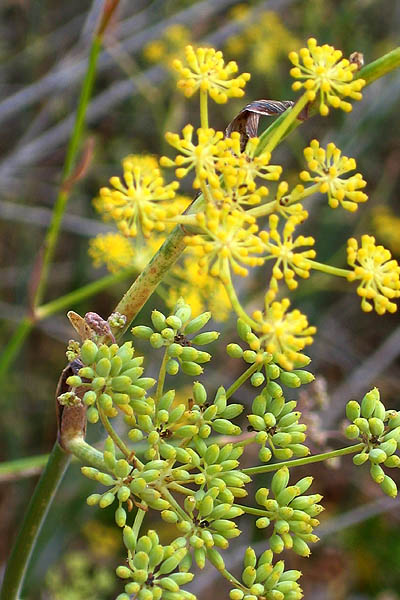|
|
| Life form: |
| Hemicryptophyte |
| Stems: |
| Up to 250 cm, erect, solid glaucous-green; hollow stems |
| Leaves: |
| Alternate, rosette, dissected twice or more |
| Inflorescence: |
| Compound umbel with 15-40 spreading-ascending rays, each 1-4 cm long. |
| Flowers: |
| No sepals, yellow petals with narrowing tips, 5 small stamens, inferior ovary topped by two short styles |
| Fruits / pods: |
| Oblong-ovate, 3-5 mm long, glabrous, upper side compressed, with thick, noticeable ridges |
| Flowering Period: |
| July, August, September, October, November |
| Habitat: |
| Batha, Phrygana, Disturbed habitats |
| Distribution: |
| Mediterranean Woodlands and Shrublands, Semi-steppe shrublands, Shrub-steppes, Deserts and extreme deserts |
| Chorotype: |
| Med - Irano-Turanian |
| Summer shedding: |
| Perennating |

Derivation of the botanical name:
Foeniculum, Latin foenum, hay (smell). The Romans called it foeniculum, meaning fragrant hay. The Roman name was corrupted in the Middle Ages into Fanculum, and this gave birth to its alternative popular name, 'fenkel.'
vulgare, common.
The Hebrew name: שמר, שומר,Shemer, Shomer; Aramaic: שומרא, shumra; Kil'ayim 20:1
- The standard author abbreviation Miller is used to indicate Philip Miller (1691 – 1771),a botanist of Scottish descent.[
- Hippocratus (c.460-c.377 BCE), a Greek physician, described the herb as a stomach soother to treat infant colic.
- Dioscorides (ca. 40-ca. 90), an ancient Greek physician, pharmacologist and botanist, deemed it an appetite suppressant and recommended the seeds to nursing mothers to boost milk production.
- Pliny(23-79 CE) included Foeniculum vulgare in 22 medicinal recipes and noted: ". . . serpents eat it 'when they cast their old skins, and they sharpen their sight with the juice by rubbing against the plant."
- Nicholas Culpeper (1616 – 1654) says: 'One good old custom is not yet left off, viz., to boil fennel with fish, for it consumes the phlegmatic humour which fish most plentifully afford and annoy the body with, though few that use it know wherefore they do it. It benefits this way, because it is a herb of Mercury, and under Virgo, and therefore bears antipathy to Pisces. Fennel expels wind, provokes urine, and eases the pains of the stone, and helps to break it. The leaves or seed boiled in barley water and drunk, are good for nurses, to increase their milk and make it more wholesome for the child. The leaves, or rather the seeds, boiled in water, stayeth the hiccup and taketh away nausea or inclination to sickness. The seed and the roots much more help to open obstructions of the liver, spleen, and gall, and thereby relieve the painful and windy swellings of the spleen, and the yellow jaundice, as also the gout and cramp. The seed is of good use in medicines for shortness of breath and wheezing, by stoppings of the lungs. The roots are of most use in physic, drinks and broths, that are taken to cleanse the blood, to open obstructions of the liver, to provoke urine, and amend the ill colour of the face after sickness, and to cause a good habit through the body; both leaves, seeds, and roots thereof, are much used in drink, or broth, to make people more lean that are too fat. A decoction of the leaves and root is good for serpent bites, and to neutralize vegetable poison, as mushrooms, etc.'
- John Milton (1608 – 1674), an English poet,in his epic poem Paradise Lost, alludes to the aroma of the plant: "A savoury odour blown, Grateful to appetite, more pleased my sense Than smell of sweetest Fennel."
- Henry Wadsworth Longfellow (1807-1882), a United States poet: "Above the lower plants it towers, The Fennel with its yellow flowers; And in an earlier age than ours Was gifted with the wondrous powers Lost vision to restore."
|

